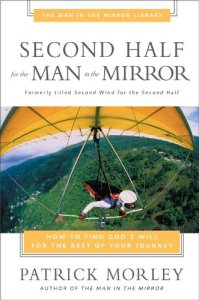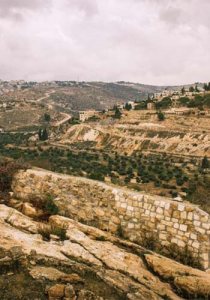 A few years ago, my men’s group from church did a great study about “The Second Half” by Patrick Morley. The focus of the book is to help men understand the different phases of their lives, how to navigate through the mid-life phase, and then how to build the “second half” of their lives. Though both men and women experience the mid-life phase, men experience it differently because much of their identity is defined by their work or career rather than their children.
A few years ago, my men’s group from church did a great study about “The Second Half” by Patrick Morley. The focus of the book is to help men understand the different phases of their lives, how to navigate through the mid-life phase, and then how to build the “second half” of their lives. Though both men and women experience the mid-life phase, men experience it differently because much of their identity is defined by their work or career rather than their children.
Generally speaking, our adult lives are divided into two parts, a first half and a second. The first half (starting roughly after graduating from high school) encompasses college and early career, finding a partner, and often building a family. The second half begins soon after the children begin their first halves, either by leaving for college or moving out of the house. When the “empty nest” sets in, people often find themselves restless, purposeless, bored, or even depressed.
Often during this time of the ending of the first half or the beginning of the second half is when “mid-life crises” occur, when extra-marital affairs take place, long-standing life habits and routines suddenly change, or people pursue a change in careers. During midlife, people often try to change their lifestyle, their appearance, moving elsewhere, getting a divorce, buying a new home or car, changing their tastes, and all sorts of other things to try to fill that sudden void or listlessness that they’re now feeling.
It’s also during this time of mid-life when chemical, physical, or biological changes are occurring, such as menopause, our metabolism slowing down, our strength and stamina decreasing, and odd aches and pains that crop up. However, those changes aren’t the primary cause for such mid-life crises as much as a confusion in identity: how that person sees themselves and even realizing that they’re not who they want to be. It’s in this mid-life stage that many people wake up one morning and question what they’ve really done with their lives and wonder who they are.
Over the last year, my wife and I have been preparing for the “second half” of our lives together, though we didn’t really consciously set out to. A year and a half ago, I found myself back in Cape Canaveral, Florida, where I had lived thirty years earlier starting a new life after leaving home. While I was there (both times), I had no clue as to what the future had in store, often not really even knowing where I’d be living beyond a month or two. Six months later, I was in Michigan for a few months helping my parents after my dad had open-heart surgery, and then soon after that my wife and I were back together. It was a rough year, to say the least.
Now we’re in the process of moving to a different home in a different state with a different climate than we’re both used to. Our kids are all graduated and well on their way with their own lives. The conflict and tension that had hung over us and our marriage has ended, and the last year has been one of rest and rebuilding together. For both of us, it’s the start of our second half. We’re both rather surprised at where this journey in life has taken us.
While I was out for a long walk this morning listening to an audio-book on the Holy Land, it struck me that our spiritual lives generally follow the same pattern/sequence as the ancient Israelites. In their history, they went from infancy to bondage (in Egypt) and were then liberated by God to go to the Promised Land, but along the way, they had to first sojourn in the wilderness where they would be tested. They had expected to enter the Promised Land in a matter of weeks, but because of their faithlessness, complaining, and rebellion, their journey that could have taken less than forty days turned into one that lasted forty years!
In our own journey (spiritually speaking), we go from infancy/youth to bondage (sin), and then from bondage to liberation when God brings us into His family and sets our sights on the Promised Land (Heaven). However, before we can go there, He places us in the wilderness of this world, where we are to sojourn and undergo our time of testing, refinement, and even wandering until He calls us Home.
 “By faith Abraham, when called to go to a place he would later receive as his inheritance, obeyed and went, even though he did not know where he was going. By faith he made his home in the promised land like a stranger in a foreign country; he lived in tents, as did Isaac and Jacob, who were heirs with him of the same promise. For he was looking forward to the city with foundations, whose architect and builder is God.” — Hebrews 11:8-10
“By faith Abraham, when called to go to a place he would later receive as his inheritance, obeyed and went, even though he did not know where he was going. By faith he made his home in the promised land like a stranger in a foreign country; he lived in tents, as did Isaac and Jacob, who were heirs with him of the same promise. For he was looking forward to the city with foundations, whose architect and builder is God.” — Hebrews 11:8-10
Like Abraham, Isaac, Jacob, and our other spiritual patriarchs, we are called to be strangers in a strange land and sojourners, all the while spreading our faith and knowledge of Him to those we encounter along the way.
